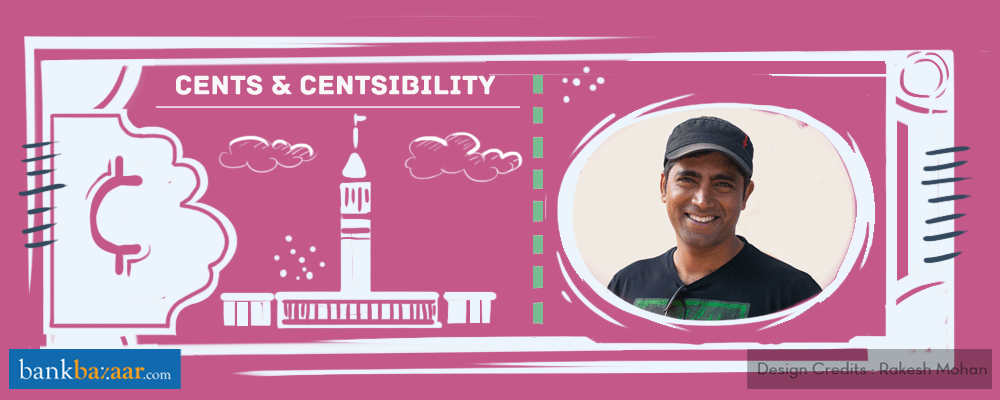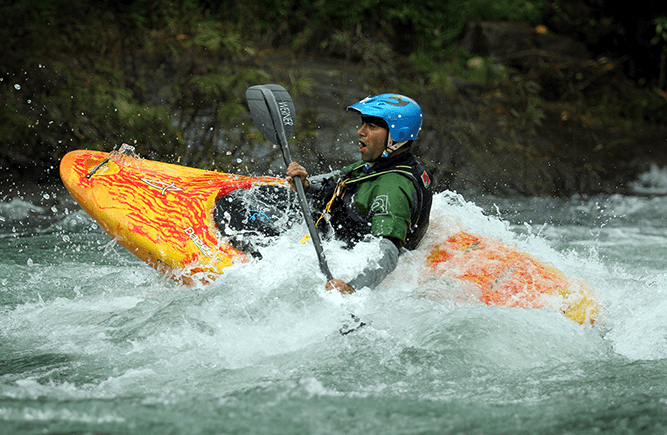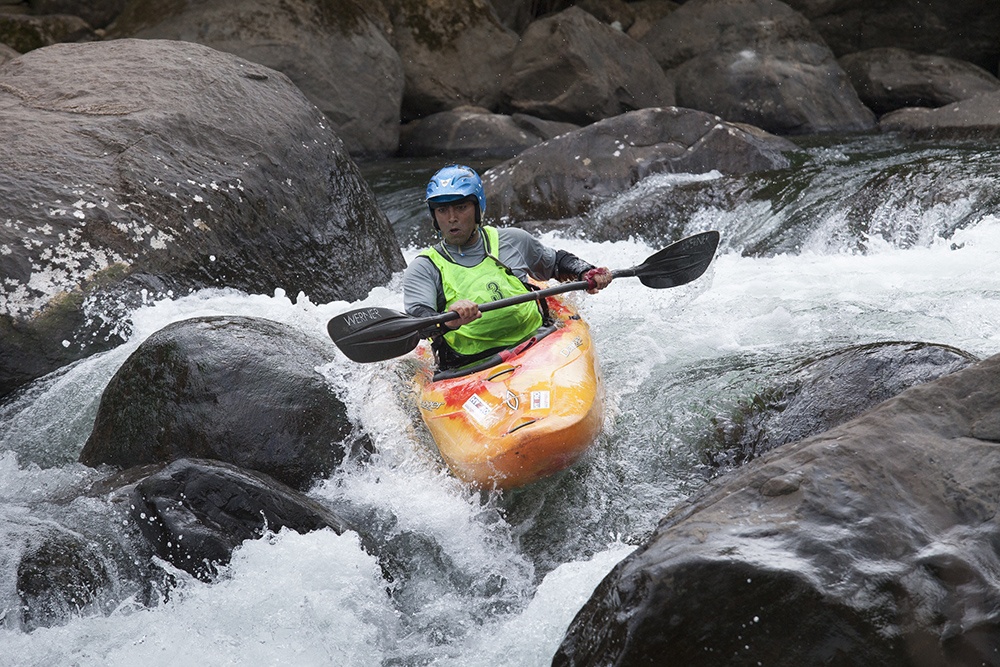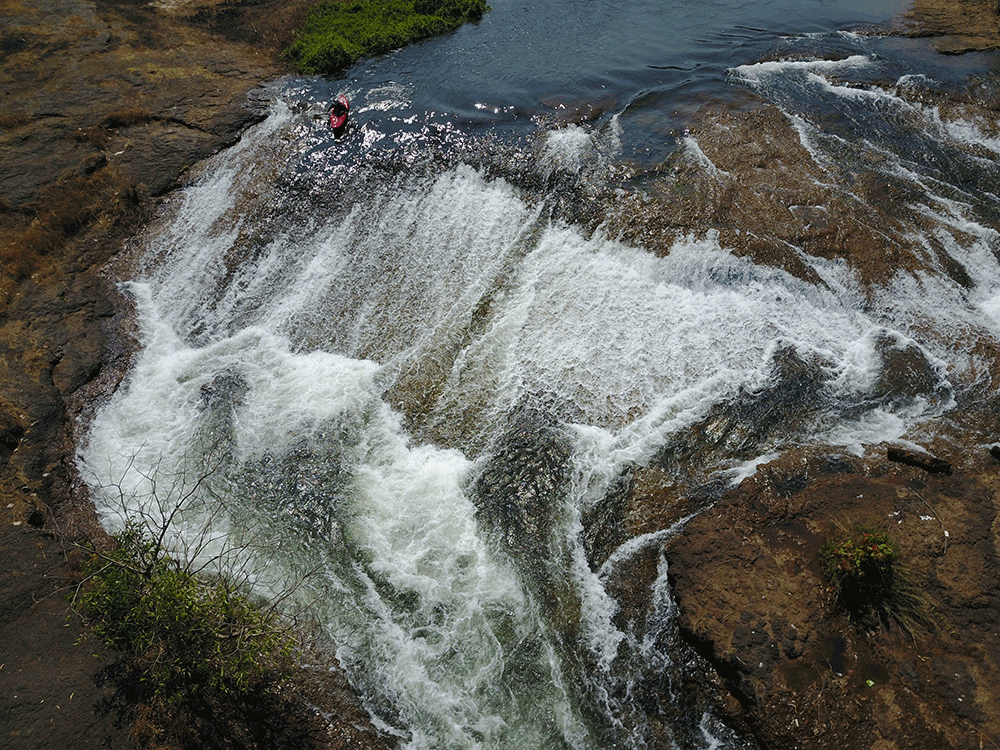The co-founder of GoodWave Adventures, Manik Taneja shares his journey of kayaking and how he came about starting the company while holding a full-time job as a software engineer.

“The two most important days in your life are, the day you are born, and the day you find out why”- Mark Twain.
And yet sometimes you spend an entire lifetime figuring out your purpose. The end result? You either die paying taxes and Credit Card bills or simply succumb to life’s other pressures.
But let this not dishearten you, because if you set your mind to doing what you love, you can achieve whatever you wish to. So, even if you like dancing or singing, or mountaineering or kayaking, you can make headway in it if you put your heart to it.
Yes, you heard it right, we said kayaking! A relatively new adventure sport in India, Kayaking is gaining prominence over the last few years. We talked to Manik Taneja, who co-founded Goodwave Adventures which is South India’s first White Water Kayaking School.
Read on to learn about Manik’s journey as a software engineer to a certified Kayak Instructor, his advice for young entrepreneurs, his take on managing finances, and all about his experiences on the rivers of South India.
Until a few years ago, kayaking was a sport that was unheard of, and naturally, you’d be curious to know how it all started. We asked Manik about the thought process behind starting Goodwave Adventures.
Tell us something about yourself and how you started Goodwave.
“I am a software engineer by profession and currently work as a software architect at Nutanix here in Bangalore. I’ve completed my B.Tech from Pune and I have a master’s degree from Amsterdam University. Before I started kayaking, I used to do some amount of climbing (mountaineering) and mountain biking.
About seven and a half years ago, the kayaking scene in Bangalore had just started picking up, but there were only a few kayakers. And since not many people had heard about this sport, we had trouble getting more people to join us.
We faced all sorts of issues when we started, like people stopping us, especially the cops and asking us where we were going. If that wasn’t enough we’ve also got arrested a few times when it all began. (laughs).
At that point, we thought that the only way to solve this problem was to get more people on board, and look at the challenges more closely and make it easier for people to have access. Given that Bangalore and Chennai are rather big cities, back then most kayakers would learn the sport in Rishikesh and come back here to only practice. This took a lot of dedication and time.
Thus, we decided to give them quality instructions here so they didn’t have to go elsewhere to learn and come here to practice kayaking. This is how we started Goodwave.”
Tell us a little about Goodwave and what it offers.

Pic Courtesy: Mojin Thinavilayil, Calicut
“The first question that we get from most people who know a little about river rafting and kayaking when we tell them about Goodwave is if there is whitewater in the south. And our answer to them is, ‘You’d be surprised’. The Western Ghats have numerous rivers and the quality of whitewater down here is top notch, especially in the monsoon season.
It’s funny that people go all the way to Norway or New Zealand to kayak when the Western Ghats in South India have equally good quality of whitewater that makes for great kayaking down here. The unique feature of these Ghats is that during the monsoon, a lot of rivers produce international quality white water which is as good as what one would find anywhere in the world.
Moreover, these rivers have and create many sections which make for great training, be it beginner-level sections, intermediate-level sections, right up to super-hard sections that increase the scope for kayakers.
The only drawback is that the monsoon season is relatively shorter down south. Typically, the monsoon season is from June to October. The other options post this season are slightly limited, but nonetheless, there are options all year round. For example, the River Cauvery in Karnataka and River Kali in Dandeli are options throughout the year.
The amazing thing about the Western Ghats is that it gives rise to plenty of river sections on which there is water throughout the year. These sections make for ideal training grounds where you can pick up all your skills and get ready for the monsoon season. You’d get about seven to eight months where you’ll have some water that’s available for training/learning. Also once you have learned the basics, you can even go up north to the Rishikesh and the lower Himalayas and try out some of the sections there.
Goodwave provides quality instructions to those who come to practice and learn the sport. We have a lot of people that come in from Bangalore, Chennai, Cochin, and Calicut. At Goodwave, we replicate models and best practices that are followed in top kayaking schools in the US & Europe.
For working professionals who pursue kayaking as a hobby, we provide weekend courses too. We’re structured as per the ACA (American Canoe Association) syllabus, and strive to have a personal connect with people who come to Goodwave.
When learners look at me, they are made to believe that it isn’t impossible to have a full-time job and yet excel at kayaking. It gives them some amount of inspiration and motivation to take up kayaking as a hobby, which is what Goodwave promotes too.
The other aspect is to form a community for kayakers. We actively encourage people who have learned from our school to come and help us. This way, we form a community and it’s a great way to connect for both the sport and the people. Sometimes we also hold Kayak gatherings over a few beers with like-minded people. It’s a great way to bond and that’s the whole idea, right? In short, Goodwave replicates high-quality instructions, lets kayakers connect and network, and enjoy this sport.”
How did you come to think of something like kayaking? Did you always want to do this?

Pic Courtesy: Rahul Gudipudi, Bangalore
“Yeah, I was always addicted to water. I learned to swim when I was five and enjoyed anything to do with water and water sports. When I came back from Amsterdam in 2007 after completing my post-graduation, I did some amount of mountaineering and mountain biking. Then, I went on a three-day rafting expedition on the Ganga and I liked kayaking, and from that moment onwards I knew that this is what I wanted to do. Two years later, I set up a course along with a friend of mine and took time off. That’s how it all started.”
Being a relatively unheard of sport in India earlier, especially in smaller towns, what was the general reaction of people when you appeared on a river around them?
“Well, the start was rather challenging, since the sport itself was rather unpopular and the Forest Department and the Police Department almost got us arrested. They had no idea what was going on and seeing us like that was rather intriguing for people around.
In general, in India, anything that is unknown is a big ‘NO’. But once we got started, it became an instant attraction for people to see us in our kayaks and it gradually gained its well-deserved popularity. And that’s how we started the Malabar River Festival too. This year will be the fifth consecutive year in a row that we’ve been organising this festival.
The Malabar River festival attracts quite an audience, it has participation from some of the world’s best kayakers and it has put India on the World Kayaking Map now. This has now become the largest White Water festival in Asia in terms of participation, audience, and prize money too. We have quite an audience for this festival each year and the numbers only increase.”
Note: The 6th edition of the Malabar River festival, which is to be hosted in the beautiful state of Kerala, is all set to roar and rage between July 19th and 22nd. The festival is slowly fortifying its reputations as a major Paddlesport event with the global paddling community and is garnering more and more attention with each new edition. This particular edition has specifically stoked curiosity of paddlers around the world with news of a never before tried format that will soon to be unveiled. What more? You can win more than Rs. 15 lakhs in cash prizes. Paddler or not, you shouldn’t miss the event for all the adventure it offers.
I see you’re a certified kayaking instructor (from the USA). How did you go about funding this certification/course?
“Everything requires finances and to simply jump in and make this a full-time profession wasn’t going to be sustainable. Goodwave was started by three of us, two local Bangaloreans and one Italian guy.
We knew that this wasn’t going to be a sustainable profession or even income for that matter from day one, and we decided to structure this as what I call it a “serious hobby”. We got into it telling ourselves that if in a few years we saw that the sport picked up, then one of us would do it full time and the rest would follow. This way, we’d also be able to pay salaries from the company and hire staff if required. Basically, we’d make money from it.
With regards to funding, we took some part of our savings and started the company. My Italian partner and I went to the US and did a course which cost us around USD 1,500 – 2,000 each.
Undoubtedly, this required planning. I clubbed the course into one of my business trips. So, I took a few days off during one of my work trips and got done with the kayaking course while I was in America.
The good thing about doing this course in the US is that there are always courses like these going on because America is a massive country with plenty of rivers which are ideal for kayaking. So, there’s always some course happening throughout the year in some state or the other. I just had to align it with my travel plan. That according to me was a wise decision and yes, it always helps when you plan in advance.
Coming to think of it, that’s also how kayaking works – it requires a lot of planning. When you’re running an expedition on the river, you have to be able to plan well in advance. This is also the kind of discipline that any adventure sport teaches you – planning things to the minutest details.
You have to be prepared for everything with a plan, for example, an emergency evacuation plan, study the river in advance to know its volume, gradient and other characteristics such as the “put-in” and the possible “take-out” (the point that you get into the river, and the point you get out of the river.)”
BB Tip: If you want to pursue an interest, it will make sense to first ascertain the cost associated with it. For instance, if music is your passion and you want to take guitar lessons, you’ll have to first find out the cost of these lessons, when and where they are available and then fit them in your schedule.
This means you’ll have to start saving up for it and use funds that don’t hamper your living expenses and other financial commitments. A great way to start saving is by investing in Fixed Deposits. Did you know that BankBazaar launched paperless Fixed Deposits?
How did you get started at Goodwave? How did you back yourself financially?
“At Goodwave, we have made some wise decisions. We have a school and a shop, Madras Fun Tools (www.madrasfuntools.in). The school caters to people who want to learn and the shop sells high-quality kayak equipment and other kayaking gear.
The equipment isn’t easily available in India and has to be imported. Therefore, it’s expensive too. So, if we were to bring in one kayak at a time, it would turn out expensive. We had to find a better way to do this, therefore minimising costs. And the only other way to do it was to fill up and ship a container and get as much equipment as possible. If not, we’d have to pay a ton of money as customs duty and other taxes on each product which isn’t really a smart thing to do. But before any of those high-priced purchases, we had to go about convincing people who were already training with us to buy this equipment by way of pre-booking them from us. We had to offer discounts to them and encourage them to invest in their own gear.
And that’s how we minimised the costs and we were pleasantly surprised when we broke even in the first year itself. And the second year onwards, we started making a profit. We ran a really light operation in the beginning because it was just us (the three of us) and we weren’t drawing salaries from the company so we were able to cut costs in those aspects. And whatever profits we made, we started investing them back into the company. Considering that we are the first people to set up such a company, we don’t have much competition. That really helped!”
BB Tip: Minimising costs means cutting down on your spending and not rack huge Credit Card bills. This also means that you’ll have to choose a good Credit Card that suits your lifestyle. It’s easy to get misled, and sometimes skip payments, but with an option to pay your bills online you can keep a tab on your expenditure and not let late payments and defaults affect your Credit Score.
Turning a passion into a well-paying profession is hard sometimes, but you seem to have done it with great ease. What would your advice be to people who want to pursue their passion/dreams?

Pic Courtesy: Manik Taneja
“In the end, it boils down to just two things – planning and risk management. Evaluating what your skill level is versus the kind of rapid (challenge) that you’re up against (in this case of kayaking). But, this theory applies to almost everything in life. Planning is imperative and so is risk management.
With anything that you are passionate about, there are days that you feel up to it and then there are days you feel down. It’s normal to feel that way and recognising that it is your off day and walking away from something is totally acceptable. One always needs to live to fight another day.
For instance, when I first started kayaking, my family members started questioning my decisions and would often ask me why I need to invest my time and money into this, and why I simply can’t keep this as my hobby. But here’s the thing, you need to put in the hours one way or another, but as long as you’re enjoying it, it all comes naturally. And now that we are fairly successful, everyone is happy that I took up my hobby so seriously.
So, if you’re willing to put in your 100%, you should pursue it. At the end of the day, people will not look at the time and dedication you put in, but that’s what passion is all about. You simply go after it. In the end, it’s all about how you manage your life and your financial resources.
Keep an open mind, have a sustainable income and simply do what you love.”
BB Tip: You need money to do anything, but, if you’re short, you can always avail of a loan. A Personal Loan, in particular, is easy and fast to get. But also remember, it’s important to calculate your EMIs and repay them in a timely manner.
Additional Reading: How to Avail Paperless Personal Loans
Do you think that there’s more to just pursuing your passion/dream, what are those things?
“There’s no right answer to this question. But I believe in one thing, that you must not kill the goose who’s laying the golden egg. In my case, it’s my engineering degree and my day job which puts food on the table and brings in enough money for my sustenance.
The important thing is how you structure it. Different people have different approaches. Depends on the line/field you want to pursue. When you’re breaking new grounds, it’s important to analyse risk, chart out your vision and give it time to pick up. Start working backwards all the way to the top. Make your dreams come true.”
BB Tip: If doing unconventional things is your thing, then unlike people who follow the regular route of saving money through a savings account or Fixed Deposit, you can try investing your money in Debt Funds, stocks, Mutual Funds and the likes. These types of investments reap higher returns and are sometimes tax-saving instruments too.
Additional Reading: All About Risk In Debt Funds
What do you do when you’re not training/kayaking?
“When I’m not training or kayaking, I’m usually writing code, reading about kayaking, working on our website, and finding out what other kayakers around the world are doing. I like spending time at home and with my dog, every now and then I also like to hang out with my friends and grab a few beers.”
Do you think it’s important to have a plan B / second source of income for people who make their passion the only source of (unsustainable) income?
“Have a plan B for everything in life. Period. You need a backup to get out of a situation and it’s always nice to envision a worst case scenario and be prepared for it. Don’t be negative but be prepared to face the consequences if things go wrong.”
BB Tip: Your passion may or may not fetch you sustainable income. But having said that, it’s always important to have a steady source of income which will cover your day to day needs and let you leverage your savings into using them for your passion and other interests. While some hobbies would fetch you some income, that money can be kept aside or eventually used to support your passion.
Additional Reading: 7 Unconventional Ways To Make Money
What does the future hold for the sport/ for Goodwave?
“The future looks good. The business is picking up and the government has started recognising the sport. We have a green ticket from the Government of Kerala, and thanks to them we now have access to certain areas which are national forests too with their permission. The Government of Kerala has been very friendly due to the Malabar Festival which boosts a certain amount of tourism for the state as well.
The Karnataka government is also getting involved now, which is great news. And business-wise we are also doing pretty well. Two years ago I used to get one inquiry a month and now I get two to three inquiries a day which is a testimony to how well the sport is being received.
It helps when people want to venture into unknown areas of adventure sport and most people residing in cities have that outlook in life.
While our end goal is to make money, that’s not our only goal. Because at Goodwave we believe in doing things right and money just follows.”
BB Tip: Turning your hobby into a well-paying job might take some time. But with sincere effort, commitment, and wise financial planning, you could turn that around and make it your sustainable source of income too. And while you’re making enough money, be sure to invest it smartly. Mutual Funds are considered valuable investment instruments.